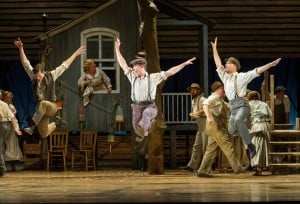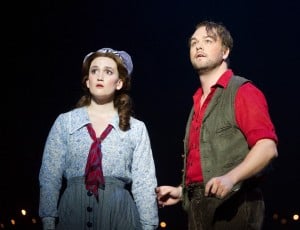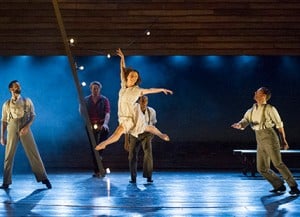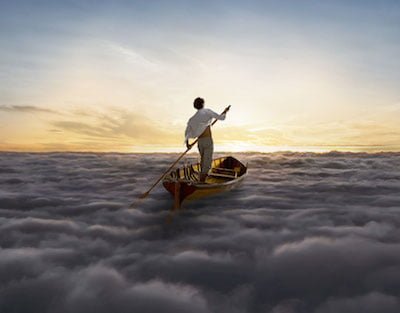‘A Captivating Evening’ at Opera North’s Carousel
June 4, 2015
[All images credited to Alastair Muir]
Carousel is one of those big matriarchs of the musical theatre world, a classic up there with other Rodgers and Hammerstein works such as Oklahoma!, The King and I, and The Sound of Music. Such a classic, in fact, that it is one of those things that people assume everyone interested in musical theatre has already seen. I hadn’t, and this needed to change.
When Opera North first brought their production of Carousel to Leeds Grand Theatre in 2012, unfortunately I missed it. Thankfully, a pair of front row seats came my way and on 21st May, I finally understood why it has played such a big part in the musical theatre scene for so long. ‘But musical theatre? Opera North?’ you may wonder. Rodgers and Hammerstein, like Sondheim, blur the boundaries of opera and musicals in terms of the musicality and technicality required to perform them, and the lighter voices of Opera North are perfectly suited to carry this off. Add to their talents a dynamic dance troupe, flawless orchestra and spectacular set and the recipe for a captivating evening was set.

Based on Ferenc Molnár’s ‘Liliom’ and set in 1940s New England, Carousel tells the story of a quick tempered fairground barker, Billy Bigalow, who (despite some inner resistance) falls in love with a weaver named Julie Jordan. They realise their love for each other while singing ‘You’re a Queer One, Julie Jordan’ and the well-known ‘If I Loved You’, and very rapidly go from having no intention to marrying anyone at all to becoming husband and wife. At the same time, Julie’s best friend Carrie gets engaged to a herring fisher with big ambitions, Mr Snow, and fantasises over her own upcoming nuptials. The majority of Act I is unashamedly mushy as everyone in the neighbourhood makes the most of the arrival of summer and starts falling in love left, right and centre, whilst still finding the time for a fabulously energetic full company dance number (June Is Bustin’ Out All Over).
The tone changes as the criminally-minded Jigger Craigin and his fellow whalers announce their arrival with the stirring ‘Blow High, Blow Low!’ Jigger talks the unemployed and increasingly violent Billy (now with a baby on the way) into attacking a local ship-owner for a large sum of cash. The altercation does not go as anticipated, and Billy is shot. As Julie weeps over his body, the matriarch of the fishing community, Nellie, soothes her with the famous ‘You’ll Never Walk Alone’. We accompany Billy up to heaven, where he is told that his abusive behaviour towards his wife is preventing him from entering paradise. He is offered an opportunity to make amends by returning to earth to prevent his (now fifteen-year old daughter) from making poor life choices. He watches Louise being teased by her classmates, harassed by men and fall in love, all in the medium of ballet. He then follows her back home, where he gives his daughter a ghostly slap and Julie a stolen star. The Snows (all eleven of them) have become fabulously wealthy, and everyone goes to the school graduation. After an inspiring speech from a local dignitary (who looks a lot like the man Billy met in heaven), Louise realises she doesn’t have to be so lonely and defensive, and the whole chorus gives a reprise of ‘You’ll Never Walk Alone’.

Every member of the cast contributed a sparkling energy to the exuberant production, and the voices were faultless (though many of the accents dubious). Keith Higham’s Billy transitioned from charming rogue, to menacing husband, to caring father believably, despite its speed. Gillene Butterfield’s Julie was highly convincing, eliciting my support and sympathy in turn, but was somewhat eclipsed by Aoife O’Sullivan’s ebullience as Carrie. She didn’t let the character’s energy drop once, though how realistic this would be for a woman with nine children, I don’t know. The affable Mr Snow was played with a charming smile by Joseph Shovelton, a perfect contrast to Stuart Neal’s Jigger, who managed to make a fairly reprehensible character oddly charismatic.
Huge credit also goes to the dancers and choreographers. Dance plays a central role in Rodgers and Hammerstein productions, most of them include a ballet of some sort, and this production rose spectacularly to the challenge. Louise’s ballet was performed beautifully by Beverly Grant, who delivered a strong and powerful performance, whilst never losing sight of the youth of her character. She was framed by equally talented fellow performers, making the whole sequence one of the highlights of the show. During the other musical numbers, the lyricism of ballet movement and styling was incorporated into that Mary Poppins-esque dance style that seems to be reserved for singing and dancing manual labourers, and it was done with great success.

The opening sequence in particular was worthy of note, as the whole cast created the whirling, dizzying atmosphere of the fairground through an exhilarating combination of pirouettes, cartwheels and high-speed set changes. It contrasted strongly with the tranquil, still ending, which had by no means less impact. While the main stage action was enthralling, my attention was often drawn to the sign language interpreter standing to the side. For two and a half hours, Paul Whittaker OBE accompanied the performers in their story. He seemed as invested in the performance as the cast, with the additional pressure of playing every character and imbuing his signing with their own emotions and qualities. With only the interval for a pause, Paul maintained a commitment to the show that rivalled the performers and deserves recognition for his role.
The performance really was a treat for all the senses, with the rich voices of the singers, energy of the dancers and stunning sets and costumes coming together to prove that ‘classic’ is by no means a synonym for ‘tired’. Carousel continues its tour in Edinburgh (2nd – 6th June) and Dublin (10th – 13th June), and it is well worth giving it a spin.
Philippa Watts
Filed under: Theatre & Dance
Tagged with: Carousel, Leeds Grand, musical, opera north, review, theatre



Comments